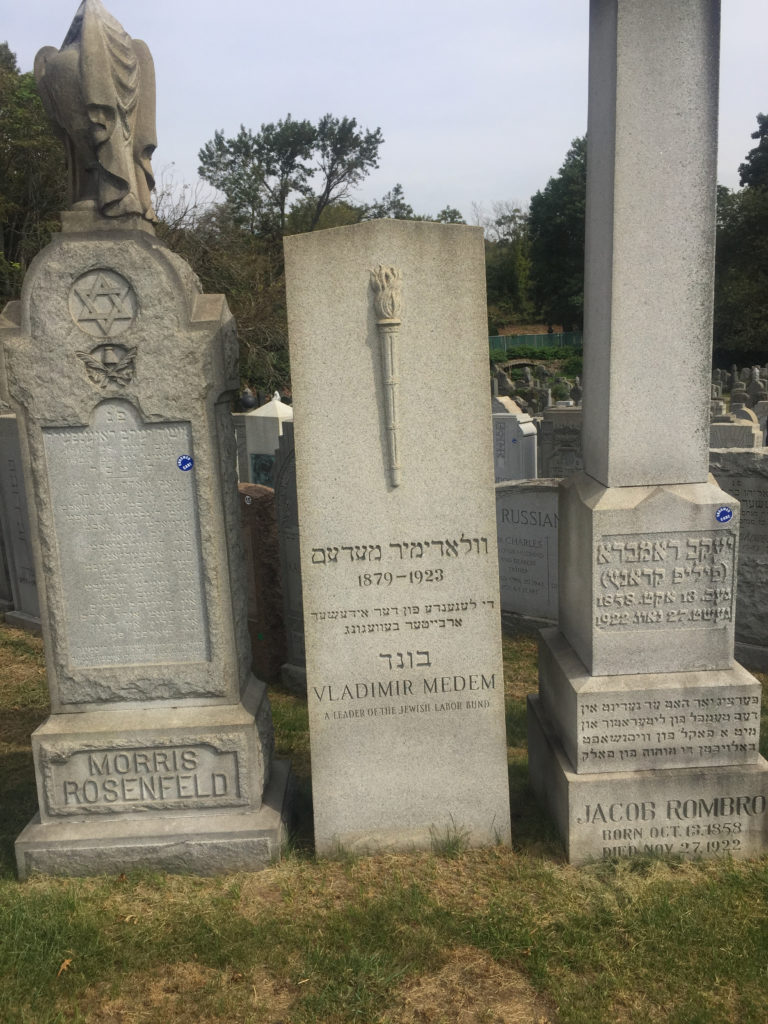Erik Visits an American Grave, Part 751
This is the grave of Vladimir Medem.

Born in 1879 in Liepāja, Russia (today, Latvia), Medem grew up in a Jewish family that had converted to Lutheranism (although some sources say it was Orthodox). His father was a Russian officer and doctor who was one of the first Jewish graduates of the Russian Military Academy of Medicine. But they were still Jewish for the people around them. Medem was not a religious Jew and he never would be. But he identified with the Jewish people, despite his father’s conversion. It bothered him very deeply that most Russian Jews were both impoverished and discriminated against. They needed to organize and yet they were not allowed to. Medem grew up in Minsk, went to school in a Minsk gymnasium and then onto Kiev University. But he had to leave school in 1899 for being involved in student strikes. In fact, he was imprisoned in the winter of 1900-1901.
Medem both began to embrace Marxism and his Jewish identity. He started reading Marxist texts and learned Yiddish at the same time. The latter was perhaps more verboten in his house than the former as his parents had completely turned their backs on their Jewish identity to rise in Russian society. After his 1901 release, he heard that he might well be arrested again. So he fled Russia and lived in Bern until the 1905 Revolution, when he returned home.
Medem became a leader of the Jewish Bund, founded in 1897 to promote the political and cultural rights of Jews. Despite all of this, Medem never converted to Judaism as a religion. His first big publication was the pamphlet “Social Democracy and the National Question,” which was one of the key early tracts that tried to work out the complexity of minorities in the state. He argued strongly against nationalism and did not believe in assimilation either. This meant that he sharply rejected Zionism. Rather, his belief was something of the liberal democrat. He argued that an active state must protect the rights of minority populations within its borders, putting himself to some extent in a minority position for the 20th century. That would be done by granting minorities a national-cultural autonomy within the state system. In other words, a state would have different nations within it, more or less autonomous on cultural issues.
Medem lived in Russia again from 1905-08, when he again fled because of his political activities. He lived abroad from 1908 until 1913. He returned again in 1913 and was arrested by the Czar’s police five days after he got back to Russia. He was sent to a jail in Warsaw until 1915, which was part of Russia at this time. He was freed when the Central Powers pushed the Russians out of the city. In 1916, he wrote The Doctrine of the Bund, laying out his ideas.
The specifically Jewish agenda of Medem and the Bund put him at odds with the Bolsheviks, even though of course many of the leaders of the Soviet Revolution were Jewish as well, including Leon Trotsky. The Bolsheviks hated the Bund and they hated Medem. The vitriol was mutual. He saw the Bolshevik Revolution as an adventurist and violent action disconnected from Marxism. He argued that the violence of the Soviets undermined popular support for socialism. He was in Warsaw for most of this time, which is probably why he was able to speak out as he did.
In 1921, Medem left the Soviet Union and moved to the United States. He lived in New York, but only survived two years there, dying in 1923 at the age of 43. I am not sure why he died at such a young age.
Vladimir Medem is buried in Mount Carmel Cemetery, Queens, New York. Next to Medem is Morris Rosenfeld, the socialist poet and sweatshop worker, who will later have his own post in this series. Not a good enough photographer to take totally separate picture here. Those graves are very close together!
This grave visit was funded by LGM reader contributions. Thanks! If you would like this series to visit other Jewish labor leaders or socialists, you can donate to cover the required expenses here. Clara Lemlich is buried in West Babylon, New York and Rose Schneiderman is in Elmont, New York. Previous posts in this series are archived here.


